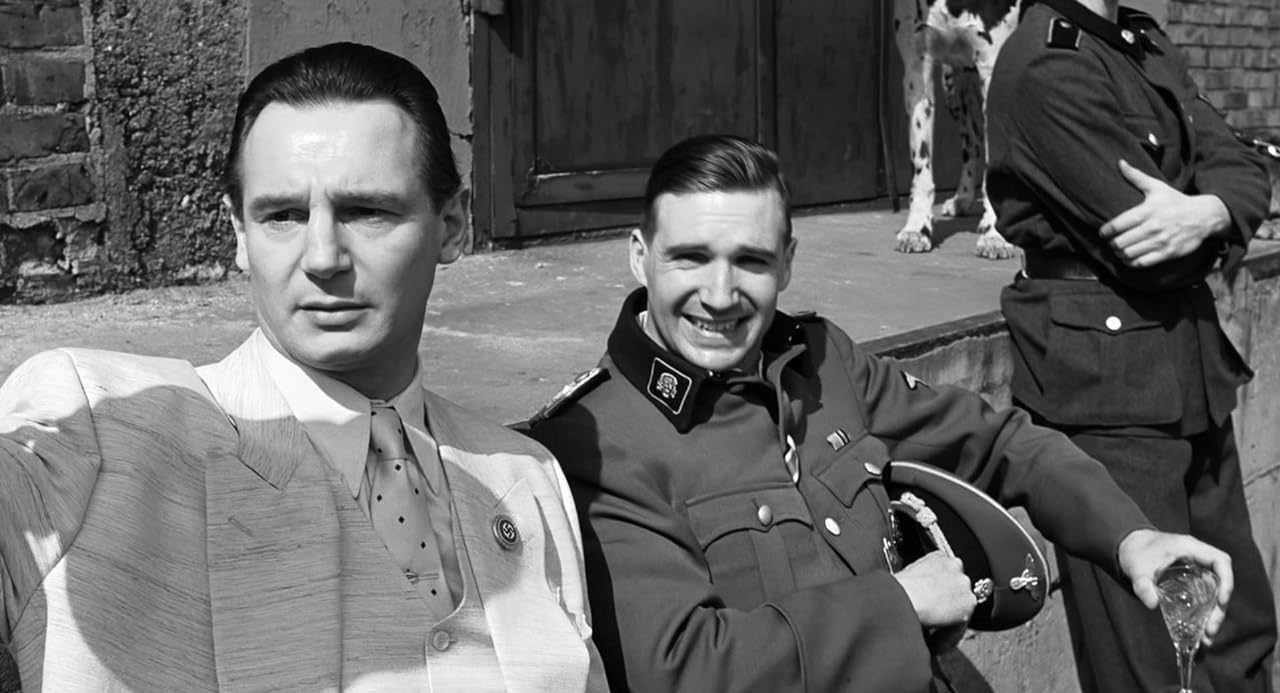Schindler's List (1993) (DRAFT)

An outstanding piece of cinema attempting a sober account of the atrocities carried out by the Nazi leadership and by those who fell into line with their orders, willingly or unwillingly.
I would imagine anyone unfamiliar with the events that took place prior to and during the Second World War will find it a particularly challenging film; some may even find it hard to believe. For those of us who've already read books, watched documentaries, seen other films, visited museums and memorials and have a fairly robust picture of the Holocaust, it is a disturbing reminder of both the extremes of evil and the ordinariness of it that mankind perpetrated then and is still able to commit now.
I did not see this on release at the cinema, but at home several years later, giving me the advantage of being able to view it without all the media noise surrounding it at the time. I must say I didn't like it then, and it's only on second viewing over the last two nights that I have come to appreciate it.
I found the film emotionally neutral. That is, I felt I was able to make up my own mind about what the horror I was witnessing, about Schindler, about the Nazi Amon Goth, without being persuaded by music or manipulation. In fact, the story telling was so subtle, I wasn't quite sure I was fully grasping what was happening. For example, the establishing of Schindler's relationships with the Nazis was reported without obvious comment. We were not lead to believe that he was doing this for any other reason than good business, but in fact, we were offered no direct insights into his thinking at all until well into the story. It was not until he was reassuring the maid, Helen, that we got any sense of tenderness or sensitivity in his make-up. Perhaps the most telling scene that confirmed his determination to thwart the Nazis if he could was when, in glowing white suit, he insists on helping the soldiers who he had commanded to hose down the Jews in the train carriages. I'm not sure that his almost complete breakdown at the end ("I could have saved more!") was necessary, but as has been pointed out by others, this film, by a mainstream populist filmmaker, aims to bring the story to those in the mainstream who need clear signals. That doesn't wash, given the subtlety throughout the rest of the picture.
Curiously, Spielberg's decision to film in black and white ("it's how we've all learned the story - from B&W footage - it's a B&W story" says the director himself), and then have a girl appear in a red dress in one scene, seemed to me to present us with a paradox. Surely, only the audience could see the difference between the red-coated girl and her monochrome surroundings. Yet we are expected to interpret this as symbolic of what Schindler was himself thinking or seeing or doing. If Spielberg had wanted to draw attention to Schindler's realisation that these were not merely crowds, numbers, workforce, but individual, innocent, vulnerable human beings, a close-up or some other editing or framing device would perhaps have sufficed.
In fact, none of the several interpretations around about the red coat seem very convincing - not even Spielberg's own, which is that it is a red flag, signalling that the Allies knew about what was going on, but did nothing to stop it. I'll settle for the simple one that it was reported in biographies that Schindler says he was troubled by seeing a girl in a red coat. That explanation will do for me. It's enough that he finally comes to realise what is going on - though I find it a little hard to believe that he hadn't been troubled by the mass murder he had already witnessed.
I've thoroughly enjoyed many of Steven Spielberg's movies - though "enjoy" isn't the right word in the case of Schindler's List - but I think one of his flaws is that he sometimes pictures a particular scene or shot that he decides he must have, regardless of whether it fits with the narrative flow, or the context in which it is thrust. The scene where Dreyfus builds a model of the mountain in his front room in Close Encounters of the Third Kind is, IMO, the most obvious example. He obviously realised that it wasn't right because he made changes to it for Special Editions, taking out the tug-of-war with the bin man for example. "Red coat" seems to me another example.
Could I watch it again, just to "enjoy" the superb performances, the cinematography, the music...when the subject matter is so horrific? Maybe not, but that doesn't mean it doesn't deserve to be included in the 1001 Movies.


